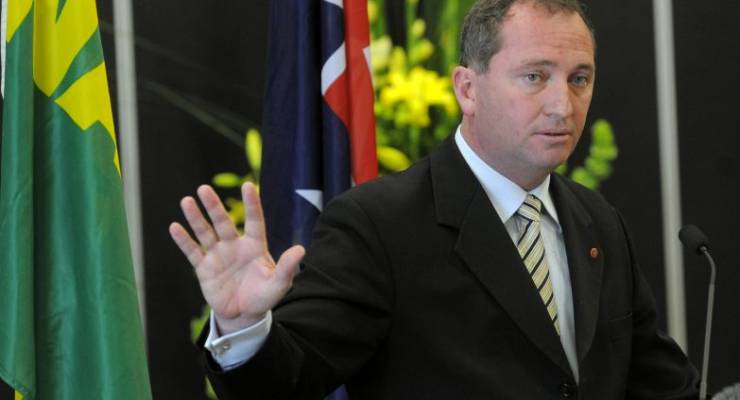
Get a better handle on transparency and freedom of information in Australia with our free workshop next Monday in Melbourne with William Summers. Details here.
I kind of like the new “carefree backbencher” version of Barnaby Joyce, with his helpful political suggestions and candid observations on modern life.
If he’s going to argue that politicians should be allowed to employ their partners though, Joyce would do well to listen to his former self.
When Tim Mathieson, partner of then Deputy Prime Minister Julia Gillard, was announced as an unpaid “men’s health ambassador” in 2008, Joyce was quick to criticise the role. “If you are appointed by reason of a relationship then that’s the oldest one in the book,” he told the ABC at the time. “It’s called nepotism, and it stinks.”
Now he’s loosened the party shackles, Joyce is positively championing nepotism by arguing that the ban on politicians hiring family members should be overturned.
“If they are qualified to do the job, if they have the qualifications, then why not allow them to do it?” he asks.
What Joyce seems to be missing is that politicians — as with all public servants – not only need to avoid political bonfires, they also need to steer well clear of the smoke.
Opinion polls regularly mark out politicians as less trustworthy than bankers, estate agents and (*cough*) even journalists. Sanctioning a system wide-open to abuse by rogue colleagues creates a glaring perception of rorting even if it doesn’t actually happen. Which it will, by the way.
Despite the majority of politicians doing the right thing (yes, really), history has proven some won’t hesitate to take advantage of lax allowances rules if given half a chance. In fact when Tony Abbott brought in the ban on employing family members in 2014, it was amidst serious allegations of cronyism and fraud by former Coalition MP Alex Somlyay, who was accused of paying his “researcher” wife for non-existent work.
Numerous other MPs and senators were, at the time, also paying family members to work for them, funded by public money and accountable to no-one.The new rule didn’t even stop family members being employed in parliament. Some simply joined the office of another politician. Problem solved!
It is a gaping loophole which deflates the idea that family members cannot work alongside their political husbands and wives. They can, but not as direct employees. MPs and senators looking to line up work for a family member are well-placed to put in a good word with the right person, or even “partner swap” to get around the ban.
It is likely there is already a whole troop of political spouses (and offspring) working in parliament — just not for politicians they share DNA with.
We are not allowed to know though, because the names of parliamentary staff are kept secret. Parliament doesn’t issue a list and politicians don’t have to include staff in their register of interests. In contrast, both the UK and US parliaments publish the names of political staffers online as a standard transparency measure. Australia should do the same, but it won’t.
Parliamentary authorities will cry that publishing any such list is a security issue — a bogus reason for keeping secret any information they think might be awkward for members. They refuse to publish a list of lobbyist passholders for the same reason.
The result is a lack of transparency around the operations of parliament, which only serves to further damage trust in the politicians working there. Joyce should recognise that the perception of nepotism and self-interest is a far bigger problem for politicians than the inability to employ a family member. Overturning the ban would only make it worse.
If politicians want to be trusted to do the right thing, they should instead be demanding a more transparent parliament.








Just what is “qualified” to a professional partisan party elitist bozo and florid buffoon like Cousin Jethro – “The Minister for Gina”?
Who chose to pursue the narrow interests of certain constituents before and at the expense of the greater national and public interest?
Who thought it perfectly all right to take freebies from Rinehart (a “wedding trip” to India – with Bishop and Gambaro – to be shown off as an indicator of her political pull) – then claim the return flight for he and his then wife on our public purse? To use his parliamentary stationery to write to her kids to lay off embarrassing her in public – when she wasn’t a constituent? A $50,000 “donation” from her to his 2013 campaign?
Who wrote-off a $90,000 CommCar, on personal interstate business, crossing a flooded creek?
Who apparently thought we tax-payers invested $billions in the M-DBA so that his irrigator mates on the Upper Darling could plunder from it : at the expense of farmers and towns down-stream, while he joked about doing “greenies” over in the process?
What a great “qualified” judge of anything – including public opinion and acceptable behaviour?
Ah, more wit, wisdom and short term memory loss from that buffoon from Woolbrook, Tamworth, Armidale , Queensland, New Zealand; wherever he hangs his Akubra is home Barney.
God, I wish he would just bugger off and take his weatherboard and iron humbug with him.
I’m surprised that “there is already a whole troop of political spouses working in parliament — just not for politicians with whom they share DNA.”
Surely there are consanguinity laws covering that?
Believe the worst. You’ll be mostly right when it comes to our politicians snouts and the taxpayer funded trough.